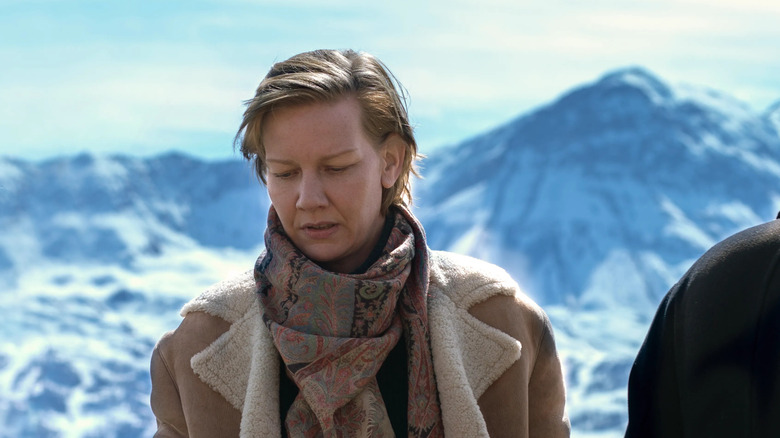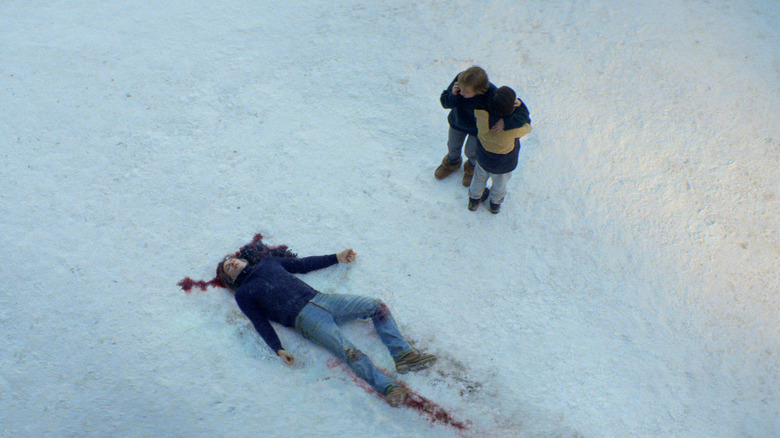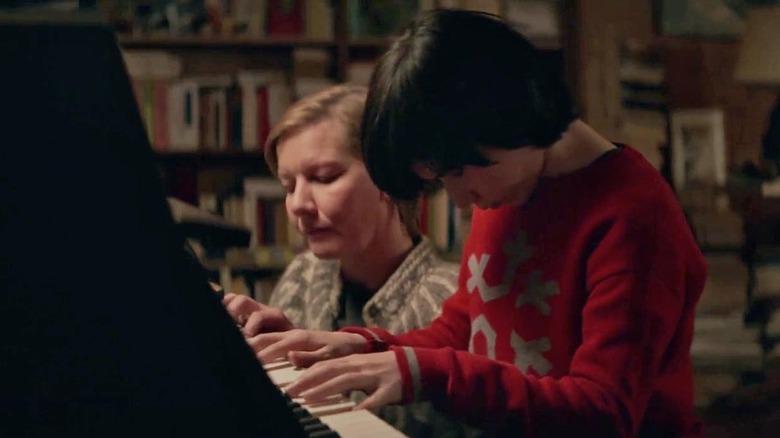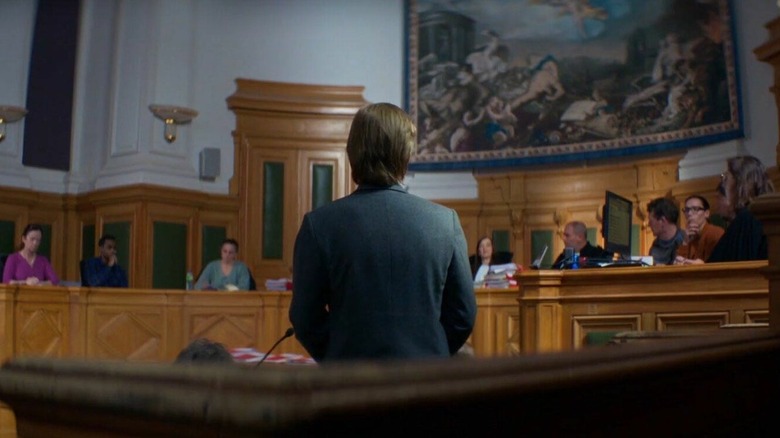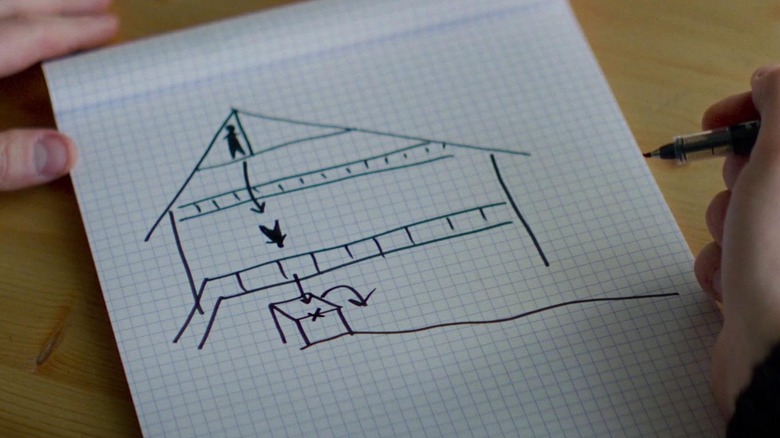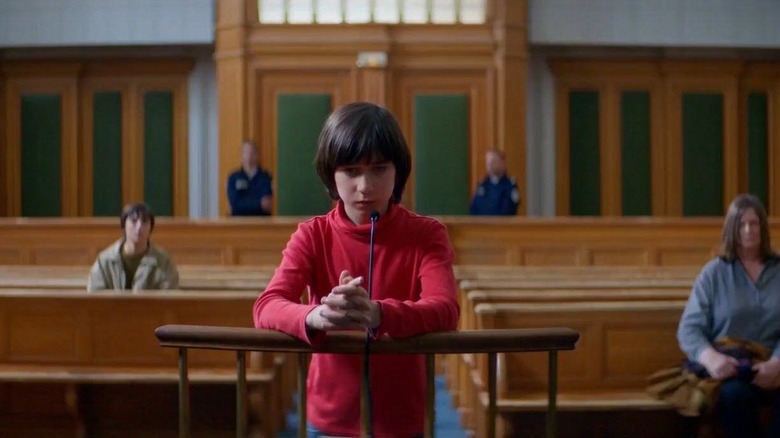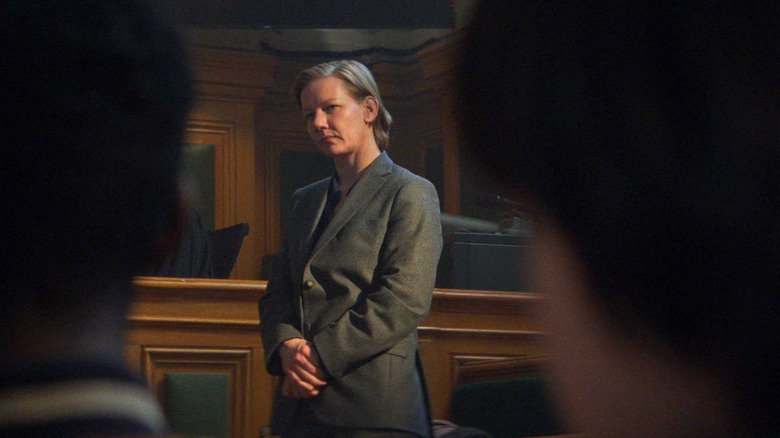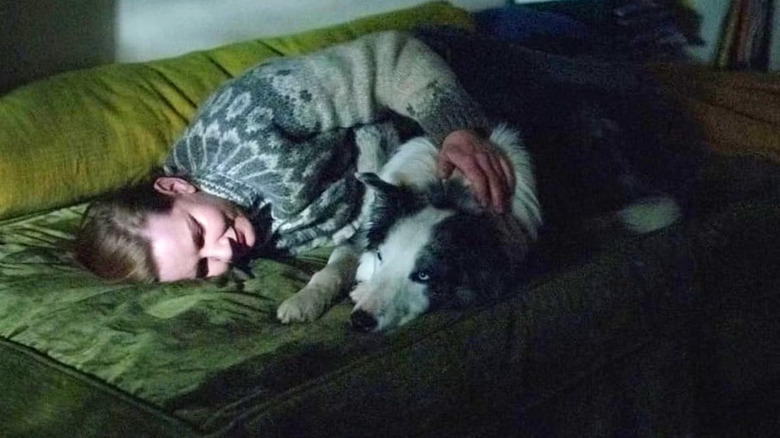Anatomy Of A Fall Ending Explained: Did Sandra Kill Her Husband?
Living with a spouse or life partner can be rough at times, and it is usually a couple's ability to soldier through difficult spells together that shows the true strength of their relationship. Introducing a child into the mix can also be challenging, often changing the dynamic and sometimes even upending traditional parental roles. But what if one of those rough patches ended with the sudden death of a partner?
That is the situation that Justine Triet presents in the opening moments of her Palme d'Or-winner "Anatomy of a Fall." However, she takes it one step further by adding another nightmarish layer to the scenario: What if the remaining partner became the prime suspect in her spouse's death and had to suffer the ignominy and stress of having her marriage raked over in court while also grieving her loss?
It's not exactly an original setup; murder mysteries focusing on a wife who may or may not have killed her husband are 10-a-penny. Yet Triet's film stands out because she uses the whodunnit format to examine the minutiae of a co-habitation and the complexities of a long-term relationship, while her trial scenes make us consider the very nature of objective truth. /Film ranked "Anatomy of a Fall" was one of the best movies of 2023, and its ambiguous ending is likely to keep conversations burning for many years to come. So, did our main character Sandra (the brilliant Sandra Huller) actually kill her husband, what clues can we glean from the film, and is that even the main point of the movie?
What you need to remember about the setup of Anatomy of a Fall
"Anatomy of a Fall" opens in a mountain chalet near Grenoble. There, novelist Sandra Voyter (Huller) lives with her husband Samuel (Samuel Theis), visually-impaired son Daniel (Milo Machado-Graner), and family pooch Snoop (Messi, giving one of the best dog performances in a long while). Sandra is giving an interview to a young student but calls it off when Samuel's music from upstairs drowns out the conversation. Sandra then goes for a nap while Daniel takes Snoop for a walk. When he returns, Daniel finds his father dead on the ground, having apparently fallen from the attic window.
The autopsy proves inconclusive; the coroner determines that Samuel received a blow to the head before hitting the ground. However, the lack of forensic evidence on the shed roof beneath the window seems to rule out the possibility that he fatally struck the edge on the way down. Furthermore, three blood spatter marks on the side of the shed appear inconsistent with that explanation. There is also the small matter of a bruise on Sandra's arm, which she claims was the result of her bumping into the kitchen counter rather than a struggle with another person.
Sandra insists Samuel's death was an accident she had nothing to do with, while her friend and lawyer Vincent (Swann Arlaud) floats the possibility of suicide, reasoning that it might be their only defendable position. While she initially rejects the suggestion, Sandra later (and somewhat suspiciously) recalls Samuel taking an overdose of aspirin months earlier. These factors, combined with conflicting stories from Daniel, lead to Sandra's indictment for murder.
What happened at the end of Anatomy of a Fall
With an autopsy report offering no hard evidence and contrasting statements from blood spatter experts, the prosecution's case largely focuses on probing into Sandra and Samuel's marital difficulties. Key to the case is an argument that Samuel secretly recorded on the day before his death, which reveals further insight into the mutual resentment that had put so much strain on their relationship. As with everything else in "Anatomy of a Fall," this crucial scene (shown in flashback as the file is played in court) neither fully incriminates Sandra nor completely paints Samuel as a man on the verge of suicide.
This leaves the prosecuting attorney to insinuate that the fight was a warm-up for a fatal argument the day after, which resulted in Samuel's death. It is also suggested that Sandra had a history of writing personal struggles into her novels. Notably, he suggests, one of her characters fantasizes about murdering her husband.
Ultimately, it may be Daniel's testimony that swings the jury in favor of Sandra. After learning of his father's previous attempted suicide, he remembers Snoop became sick around the same time, possibly from eating Samuel's vomit containing partially dissolved pills. He tests his theory by giving Snoop an overdose to recreate the effects. Daniel also delivers a final statement to the court, recalling a conversation with his dad that would appear to suggest that suicide was on his mind. Sandra is acquitted and returns home to her son, although it is clear that their relationship has changed forever.
The equally plausible cases for murder and suicide in Anatomy of a Fall
The case for murder hinges on a combination of factors in the absence of hard evidence. The assumption is that Sandra and Samuel became embroiled in an altercation during which she struck him with a blunt object and caused him to fall, preluded by the recorded argument that turned violent. This theory is supported by a blood spatter expert who states it is the only explanation for the marks on the shed and a police recreation of a conversation that Daniel overheard. It is determined that there must have been raised voices for him to hear it over Samuel's music from outside. Daniel then changes his story to say he was inside when he heard his parents talking, thereby casting doubt on his statement. The prosecution also portrays Sandra as an adulterer and a plagiarist with a violent temper who resented her husband for his negligence in Daniel's accident, as well as for uprooting her from a happy life in London to move to Samuel's hometown in France.
Meanwhile, Sandra's defense calls upon a second blood spatter expert who explains away the inconsistencies in the coroner's report. Following Vincent's advice, her testimony is aimed at convincing the jury that Samuel was capable of suicide. She paints Samuel as a frustrated figure who was wracked with guilt about Daniel's accident and self-loathing over his inability to complete his novel. This is all supported by her dubious claim that he took an overdose six months earlier after coming off anti-depressants.
How Anatomy of a Fall explores the theme of subjectivity
Triet was deservedly nominated for a Best Director Oscar for her work on "Anatomy of a Fall," and her screenplay (which she co-wrote with her partner Arthur Harari) meticulously constructs a situation where either murder or suicide is equally believable without it feeling gimmicky. The ambiguity is aided by Huller's superb performance. She seems convincingly innocent but also shades her character's more untrustworthy moments to give us a little doubt. Throughout, she is entirely unreadable — we're left still searching for clues in her face and body language, even as the end credits roll.
This is all in service of the film's theme of subjectivity. Without definitive proof either way, Sandra finds that her personality and her relationship with Samuel is what is really on trial. This opens up a broader examination of how a long-term relationship is made up of great moments and bad moments and all the things in between. As Sandra points out in court, focusing on one bitter argument in isolation is not necessarily a reflection on their marriage as a whole.
Language also adds another element of subjectivity as the narrative unfolds. Sandra and Samuel (German and French nationals respectively) communicated with the middle ground of English. Once Sandra is on trial in a French court, she is forced to give her testimony in her third language and depend on a translator to get more complex points across. In both cases, there is a possibility that her words could be misinterpreted and cultural perceptions may factor into a jury's decision.
Did Daniel lie to save his mother from prison?
Throughout the trial, we learn that Daniel has a closer relationship with his father due to Samuel home-schooling him while Sandra was always working. However, we find out early on that he is capable of lying to defend his mother when he changes his story regarding the overheard conversation on the day of Samuel's death. Although it is possible that he mis-remembered whether he was inside or outside at the time, it seems unlikely due to how the incident is presented in the film.
Daniel's insistence on staying in the courtroom as more unsavory aspects of his parents' marriage are revealed changes his perceptions of his mom and dad. There is a distinct sense that he suspects Sandra, but he still latches onto the previous suicide attempt theory. While it is plausible that Snoop fell sick after eating aspirin-laced vomit, we may also suspect that Daniel tries to force the narrative to fit Sandra's claim by spiking the dog's food.
Daniel's change of heart is complete after a conversation with Marge, his court-appointed minder. She encourages him to make his own mind up in the absence of absolute proof. He appears to take this onboard and tells the court about a chat with his dad in which Samuel said he must prepare for Snoop dying one day. He claims that he thought Samuel was talking about himself rather than the dog. Crucially, we hear Daniel's words coming from Samuel's lips in this flashback, perhaps suggesting that he made up the conversation in an attempt to sway the jury towards a "not guilty" verdict.
What did the director and star say about the ending?
Triet has stated (via Slate) that she never intended to reveal whether Sandra was guilty or not, telling her star to play her character as if she was completely innocent without winking to the audience: "Don't play the bulls**t mystery game that we always see in genre movies." Nevertheless, some have suggested Triet let the truth slip during her Golden Globe acceptance speech:
"It's radical and dark [...] Nobody's going to see this movie. It's too long, they talk all the time, there's no score, a couple fighting, suicide, a dog vomiting, I mean, come on."
That may seem like a blunder, but it isn't conclusive. Mirroring the film, Triet was speaking in English rather than her native French and it's possible she was referring to the idea of suicide rather than the act itself. She later said that she knew the answer but would only tell us in 10 years.
Huller has also kept quiet about whether Sandra is a murderer. She told Variety, "I wanted to create somebody who would be capable of doing it, I wanted certain people to be a little bit afraid of her [...] I had a little fun in leaving it in the dark." Discussing the film with CNN alongside Triet, Huller also said, "We found out quickly that [Sandra's guilt or innocence] is what the film was about, but it's not really what it's about. It's about the question, what is the truth, actually? And can we ever find it, or do we have to live with the doubt? I tried to embrace the ambiguity."
What the ending of Anatomy of a Fall means
Huller's comment about the ambiguity of "Anatomy of a Fall" is revealing about the ending. Sandra's guilt or innocence isn't the main concern of the screenplay, and there are moments when Triet seems to address the audience through her characters. Early on, Sandra states bluntly, "I did not kill him." To which Vincent replies, "That is not the point."
Triet has said that she wanted to use the courtroom drama format to examine cohabitation and the power dynamics in a relationship. Correspondingly, the "fall" in the title isn't as literal as it first appears. During the trial scenes, it becomes clear that the film is less about solving a mystery and more about forensically analyzing how a marriage falls apart in a series of stages. Given the things that Daniel learns about his mother and father in court, we may also see it as an allusion to how parents can fall from grace in the eyes of their children.
We tend to grow up thinking our mom and dad are perfect before coming to see their flaws as we get older. Daniel's case is extreme; he discovers that his father was an unhappy man who may have died by suicide and his mother is potentially a murderer. In the end, he makes a choice and we're left to ponder: Does Daniel truly believe Sandra is innocent, or has he decided to give her the benefit of the doubt rather than lose both parents?
